When my novel, A Village in the Fields, was shortlisted for the Seventh William Saroyan International Prize for Writing (Fiction) for 2016 back in May, I sent out emails to professors at Asian American Studies programs and Ethnic Studies Departments to announce my news. I also sent an email to Ann Marie Wagstaff, chair of the Language Arts Division and professor of English, at my alma mater Porterville College, where I received the Scholar of the Year Award in 1982. As it turns out, Professor Wagstaff was in the graduate program in the English Department at the University of California at Davis, my other alma mater. In fact, I was there from 1982 to 1985 and she was there from 1977 to 1987, although our paths never crossed. I enjoyed our correspondence of recollections of both UC Davis and Porterville College English professors.
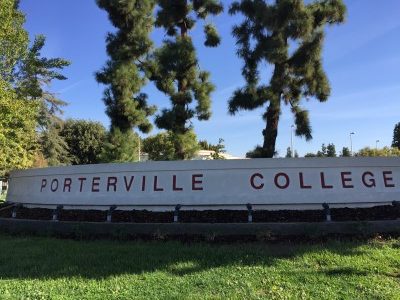
Professor Wagstaff told me about Porterville College’s Cultural & Historical Awareness Program (C.H.A.P.), which was organized in 2002 “to enhance students’ awareness of certain important aspects of our society to which they may previously have had little or no exposure.” She asked if I would be interested in giving a presentation. The theme for the 2016-2017 year is The Power of Place: Geographies of our World, Memories and Imagination: “This year, CHAP looks at the role of places in our lives with examples drawn from different fields and notions of the power of place in our thinking about our world, including real and imagined places, historical and modern places, natural and cultural places, and distant and local places. Join us on this journey through the atlas of the mind and the geography of ideas.”
It was quite easy to make the connection between my novel and the power of place, given that the story is historical and my hometown and Delano – as well as Seattle, Stockton, and Los Angeles – figured prominently in the novel, almost as characters. Over the summer, I put together the photo collage that would make up my PowerPoint presentation, guided by the chronological order of my life and a narrative of my life from a writer’s perspective. Thanks to Professor Wagstaff, who spread the word, Bakersfield College, which also offers C.H.A.P., extended an invitation to present as well, and I was happy to be included in the Delano campus’ program.
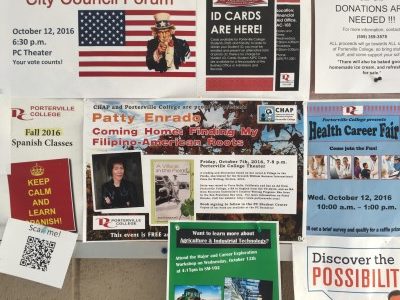
In the meantime, Professor Wagstaff asked if I would be inclined to come to her American Literature class to talk about being a writer and to discuss an excerpt from my novel while there in early October. Of course, I would – I enjoy talking to college students, especially about writing. The number of classes grew to four, which included students who are taking Argumentative Writing and Critical Thinking Through Literature, English Expository Composition and College Writing.
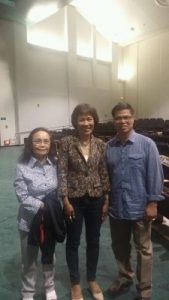
Bakersfield College C.H.A.P.
On October 4th, I gave my presentation at the Delano campus of Bakersfield College, specifically across the street at Robert F. Kennedy High School, which was the venue for Bold Step: the 50th Anniversary of the Delano Grape Strike held in September 2015. Professors Michelle Hart and Oliver Rosales serve as the co-chairs of Bakersfield College’s C.H.A.P. I had briefly met Professor Rosales at Bold Step and was looking forward to talking more in-depth with him, but illness prevented him from attending my presentation. It was a pleasure meeting Professor Hart, who served as my audio-visual equipment expert and C.H.A.P. host. My husband’s co-worker’s parents, who live in Bakersfield and along with her cousins served as my Ilocano translators, came. I was able to thank Jasmin and Art Lucas in person for their valuable assistance in helping to make my translations accurate.
While community members were in attendance, most of the audience comprised Professor Rosales’ students from his California history course. Despite the requirement to attend, many of the students seemed interested in my presentation, “Coming Home: Finding My Filipino-American Roots.” I talked about how taking Asian-American Studies classes at the University of California at Davis led me to my finding my parents’ stories and my writer’s voice, as well as enriching my relationship with both my mother and father. As I related to them, “My parents lives opened up to me.” I brought up AB123, which requires the State Board of Education to provide state curriculum on the significant role of Filipino Americans in the California farm labor movement. And I also discussed how various school districts around the state are incorporating ethnic studies as a requirement for high school graduation. Stanford University researchers found that students at San Francisco Unified School District who took ethnic studies classes garnered academic benefits – and helped build self-esteem, self-awareness, and appreciation for their culture.

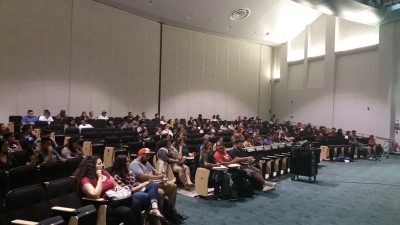
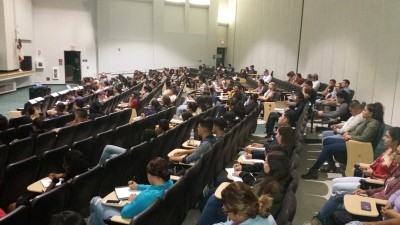
After the presentation, I had a conversation just off-stage with a parent of a budding middle-school writer. Meanwhile, the students were in a crowd by the exit. I thought that the door might have been locked, and I didn’t know why they were taking pictures of me. Professor Hart redirected them back to the auditorium to take selfies with me. While she enthused that I was a “rock star” because of the long line, I couldn’t help but laugh sheepishly. For extra credit in Professor Rosales’ class, students could take a selfie with the author. Nevertheless, the students were very polite and thanked me for coming. I also caught up with Alex Edillor, president of the Delano Chapter of FANHS (Filipino American National Historical Society), and his friend Helen, and we talked about the similarities of our childhood growing up Filipino American.
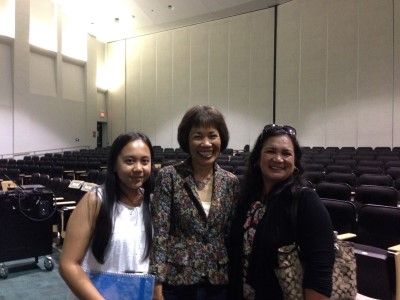
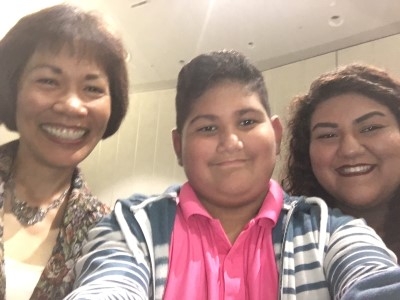
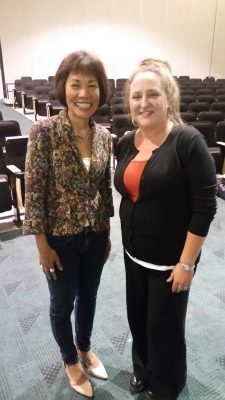
Porterville College: a nostalgic reunion
Last Thursday, October 6th, I came to campus early to walk around. I realized that I haven’t set foot on Porterville College since I graduated. So it was nice to check out the new buildings and remember the buildings that existed when I was there 34 years ago! I discretely checked out the bookstore and library displays. Porterville College’s library boasts a unique, special preservation collection of “Valley Writers,” which offers more than 500 titles from more than 200 Central Valley authors, including me, which is an honor.
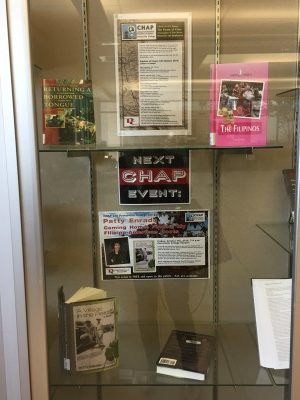
I thoroughly enjoyed meeting Professor Wagstaff in person. I felt as if we’d known each other for years based on those few months of emails. I particularly enjoyed her American Literature class because most of the students are English majors and many identified themselves as writers. So the free-wheeling discussion after giving a brief history of my academic and writer life centered around being a writer, creative writing programs, the importance of bad writing, character development, how writing is all about making decisions of what to include and what to leave out, and other fun writerly topics.
Before the second class, Professor Wagstaff and John Stern, who teaches an English Express class and attended the American Literature class, took me out to lunch. We picked up our conversation where we left off in the classroom about creative writing programs and our own writing, and our English Department experiences at Davis. The second class was in the new and impressive media room, where clusters of laptops are available for students to use. While there were a few students who were heavy-lidded, many were attentive. One student asked what disappointment I found with my research. I said it wasn’t so much disappointment in my research; if I were to just focus on disappointment and my writing, it would be that I thought I’d have published several books by now, especially at my age. I said I likely wouldn’t have kept going with this book had I known ahead of time that it would take 17 years. But I’m glad I persevered. Then I told the students about Mark Hamill’s anecdote from his closing keynote address at a business conference I attended recently: “Tenacity is more important than talent.” Talent is not to be disregarded, but tenacity, especially when you have to deal with rejection and bad writing and constant revisions, is the most important trait a writer, or anyone for that matter, can possess.
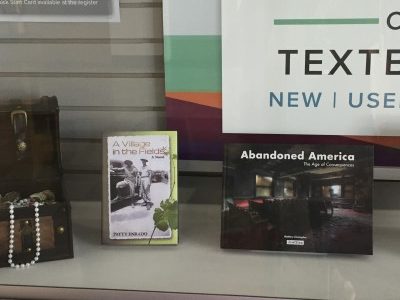
Another student asked for advice about college. Only because it’s a topic in my home, I told the students not to go into debt for their college education. You make choices about where you can go to get your education; therefore, make strategic, smart choices that don’t mortgage your future and hamper future decisions. Yet another student asked about approaching events that happen in our lives that are painful to confront. I’m not sure I answered her question or knew what she was looking for. I talked about the reason I write, which is to try to understand the world around me, understand why things happen and make sense of whatever tragedy or grief has occurred. I also noted that the joy of writing is centered on this feeling of creation, which is empowering, which becomes particularly helpful during the times when I feel powerless in my life. Creating people and places and situations for them to live through – that brings me joy. It’s the difference between happiness and unhappiness for me. After the discussion, one of the instructors let me know that what I talked about – failure and tenacity – was perfect for many of the students, as they are in the English Express class, a high-intensity class that is designed to accelerate progress to transfer-.level English. She commented that they are well aware of having to work hard and to face challenges and disappointments. I hope what I said resonates with them beyond the classroom.
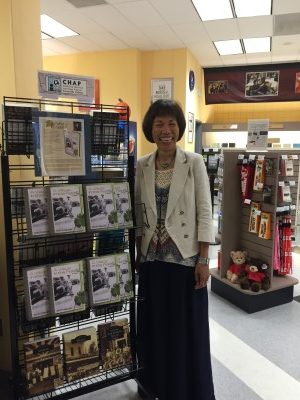
I was asked to read Roland Barthes’ essay “Death of the Author” for the last class, Argumentative Writing and Critical Thinking Through Literature. I agreed to comment as an author before I read the essay. Part of me wishes I hadn’t! I really enjoyed the literary criticism class I took with my mentor and former Professor Alex Samarin from Porterville College. We studied formalist, social, archetypal, and psychological critical perspectives. Reading Barthes’ essay, however, reminded me of the critical text we read in my teaching class at Syracuse University. I admitted to the students, who laughed, that the text was too dense for me and I took to the Internet to get the gist of it. I told them that it’s fine to remove the author from the examination of the text. I don’t agree with the idea of the author as a scribe who simply collects preexisting text and is not able to create or decide the meaning of his or her work. I believe that an author has determined his or her work to be read a certain way, that there are meanings that the author has deliberately ascribed, but I can accept Barthes’ assertion that the task of meaning falls “in the destination” of the reader.
While I also accept that “a text’s unity lies not in its origin but in its destination,” and it’s totally fine to look at literature from Barthes’ perspective, I tend to accept multiple perspective for the very reason that Barthes argues: “To give a text an Author is to impost a limit on that text.” I simply disagree. Bringing formalist, social, archetypal, and psychological perspectives give such richness to the text. I told the students that whenever I read a great book or story, I want to learn more about the story, the backstory. When I see a movie that is based on a true story or book, I want to learn more. It enriches my appreciation of and deepens my experiences with the text.
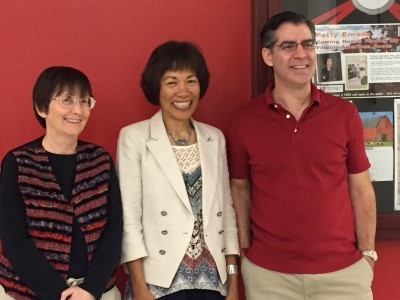
Porterville College C.H.A.P.
Professor Robert Simpkins, who coordinates C.H.A.P., treated me – and my guest, my Porterville College English professor Alex Samarin – to dinner before the event. We were joined by the Anthropology Club students who help with the presentation, Lorie Barker the librarian, Professor Wagstaff, and instructor Rachel Tatro Duarto. The nice thing about giving the same presentation twice is that your second go-around is more polished. My cousins and my father’s relative came. Professor Wagstaff introduced Professor Samarin to the nearly full house. He was the one who gave me my award on graduation night. I took independent studies courses from him, and although he was a tough teacher, he became one of my mentors. Two other English professors also served as mentors. Othel Pearson retired and moved to the Midwest, and sadly, John Reed died in an automobile accident. Professor Wagstaff let me know that Professor Reed bequeathed money to the college, which funds student scholarships and bringing speakers to campus. That was touching for me.
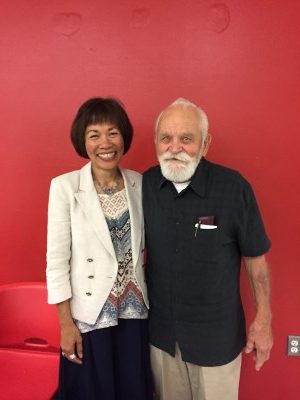
Carroll Land, who was my high school history teacher, and his wife came. I introduced him to the audience as Mr. Lander, and when I saw the look on his face, I knew I had blown it. Luckily, I recovered and remembered his name. It was great to catch up with him after the presentation. I recognized another high school friend, Richard Stadtherr, who had run into my former English for the College Bound high school teacher, Shirley Hickman. She, in fact, introduced us to John Steinbeck’s The Grapes of Wrath.
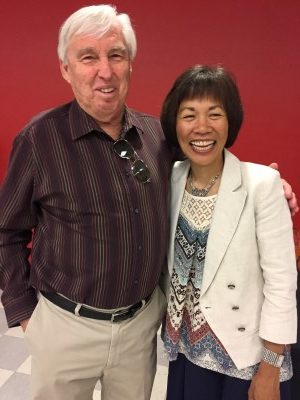
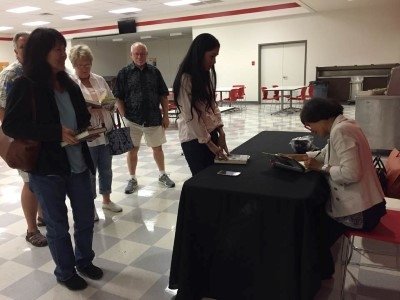
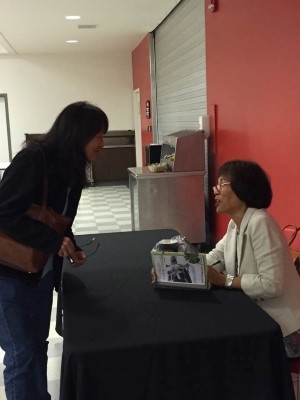
While I was nervous at the start, sharing my journey as a writer felt very natural. I felt that I was having a conversation with family, friends, and strangers in an intimate setting, not in a full theater. Their faces were animated and interested. When they nodded or smiled or laughed, I was grateful. To be heard – that’s all a speaker can ask for! And I enjoyed talking one-on-one with family and friends, and people I just met that evening during the book signing part of the event. Afterwards, my cousins, Debi and Janet; Janet’s husband, Tim; and my Manong Luz helped me celebrate a great evening with dinner and drinks. I am filled with gratitude for such an inspiring visit.


